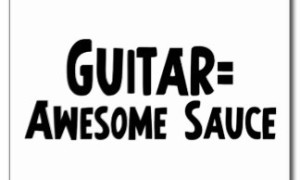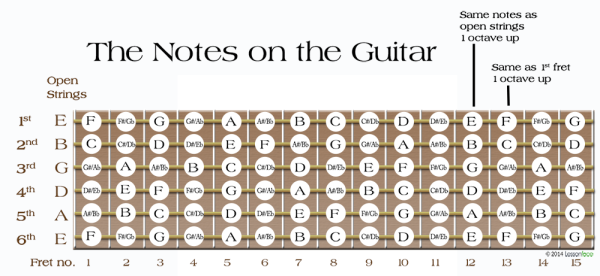Welcome to The G aka Gool’s Guitar Gossip – blogging about anything music related

Onto breaking rules, this article does not follow along the lines of any of my previous threads, but is my music business contribution one can get by signing up for the teachmusic.co.uk mailing list….. now onto our burger sauce!
It’s safe to assume that a good 9 of 10 players started out hearing some other player’s music, what turned them to the guitar in the 1st place. What makes each of them prefer one or more music styles over others is their very pre-exposure to their fave genres that form comfort zones within their minds regarding what to expect out of music, hence why one prefers the subtleness of a nylon string performance over the more fiery chainsaw playing in early industrial, or vice-versa, and any sound in between that the different forms of guitars produce. At some stage, guitarists then turn to lessons and to us as educators.
As educators we play the foremost role of capturing our students’ dreams, aiding them in their quest to turn them into reality. For most it might just be to cover songs at their local pub/ family bbq, but for others getting their name out there just as their idols before them is the name of the game. And this is where music itself takes a back seat and the actual business mind is called to the forefront.
 For a moment, imagine one runs a worldwide take-away food franchise. Was it a love for fast-food that made one start? Probably the answer has less to do with burgers & chips than with the opportunity of a fruitful long-term business. Which makes one observe that while musicians have way progressed from just playing their instruments well to learning more about backline, accessories & sound (from choice of strings, electronics, effects & amps to producing, sound engineering & mixing), some still do not recognize the extent it would benefit them if they put their hands on actually promoting their name.
For a moment, imagine one runs a worldwide take-away food franchise. Was it a love for fast-food that made one start? Probably the answer has less to do with burgers & chips than with the opportunity of a fruitful long-term business. Which makes one observe that while musicians have way progressed from just playing their instruments well to learning more about backline, accessories & sound (from choice of strings, electronics, effects & amps to producing, sound engineering & mixing), some still do not recognize the extent it would benefit them if they put their hands on actually promoting their name.
Not only via cheap/free routes the Internet provides, but by financially investing in their own product to see it hit off the ground.
To return to the take-away concept, it might be less satisfactory running a junk-food franchise than playing music, yet look at the way they run forward – every now and again they change bread, add a sauce or whatever, thus making a new menu out of it. In other words, they create opportunities for themselves. Easy to them nowadays after so many years of success, but in their humble beginnings, there definitely was lots of investment (maybe at a loss of money, surely at a loss of time). So why does it turn out that sometimes musicians fail to see the opportunities ahead of them, figure even create new ones? After all musicians are doing what they like most (playing their instrument) so one probes if, by logic, promoting oneself should only come as 2nd nature, same as owning professional gear to sound good! Needless to say, playing music is more satisfying than selling food not?
The point comes in the conclusion. The music industry (as any other) runs on the expectancy that nothing falls free from the sky. As educators, we are to foster this thinking in our students, at least the most ambitious. This will pave itself in our students managing their time even further as they start thinking more as self-employed dogs in a world of many more competing for the same bone! I once read in an innovations management blog that “If the tree cannot be moved, a new route has to be found”. This is an area that musicians – educators and performers alike – might like to look into.
www.malcolmcallus.com
Modern approaches to guitar, bass, ukulele & music theory tuition
Speak!
Wherever we live, that’s the very act we do daily. Even if we spend a day alone at home, we still end up speaking to ourselves.
The very skill of associating pronunciations to single letters, and how their sound varies according to their placement in words of our mother tongue, became innate with ourselves from the very moment of our inception, if not earlier inside our mother’s womb. And daily we use this very skill to communicate opinions to others, presuming – maybe hypothetically – that the listening party will understand everything exactly as we mean it. Yet when this often results otherwise, we speak again to explain further. Daily, constantly and effortlessly we use speech to explain ourselves.
Now let us bring this to the string instrument world. The fingerboard is our alphabet; the scales, arpeggios, chords, voicings, i.e. the very tools to put letters together to form words, which form sentences that form paragraphs, depend on a starting note on the fingerboard, and knowing where they are.
At some point in our education we learn the theoretical knowledge that defines what scale may be used and when, and as lead players, when presented with a chord chart we recall a multitude of scale patterns that fit. Presented with some one else’s opinions (compare your chord chart to this very blog for a moment), we react to what we are reading by adding our opinions (by adding your own thoughts to my opinions here as you read along, like you’d add melodic licks while reading a chord chart). How? By recalling and playing around scale patterns that fit.
That is one way, and a successful one. Yet have you ever considered the maybe more primordial approach of totally forgetting the patterns. Here we go – let’s start breaking the rules!
 Approach the fretboard only as a series of notes and if, for example, the key chosen is G major (having only one sharp being F), then apply an A-B-C-D-E-F#-G alphabet across the fingerboard, free of any patterns. All you have at your disposal is this flashy fingerboard with each fret representing a note. Feel free to play all notes as naturals except your Fs that have to be F#s. You are more than likely to be using scale shapes you have learnt, but you are not thinking of them, but only of note letters! And this is what gives you the freedom a growing child has when unaware of grammar mistakes, a freedom that paves a more adventurous explorative path.
Approach the fretboard only as a series of notes and if, for example, the key chosen is G major (having only one sharp being F), then apply an A-B-C-D-E-F#-G alphabet across the fingerboard, free of any patterns. All you have at your disposal is this flashy fingerboard with each fret representing a note. Feel free to play all notes as naturals except your Fs that have to be F#s. You are more than likely to be using scale shapes you have learnt, but you are not thinking of them, but only of note letters! And this is what gives you the freedom a growing child has when unaware of grammar mistakes, a freedom that paves a more adventurous explorative path.
Speak! Play whatever you hear in that inner ear of yours – it’s an opinion and it can only get better by speaking it out, getting feedback about its presentation from others, even your own self on hearing it back. This is how improvisation phrasing is improved. Learning by doing! Think less scalar, think more phrasal.
You get politicians the world over speak bull for a career yet make a name in history, so why not with us musicians whose words, speech, and opinions are of a higher value?
Speak!
As the Romantic playwright Victor Hugo once wrote “Music is that which cannot be silenced”, so speak as this world is nicer with more melodies!
www.malcolmcallus.com
Modern approaches to guitar, bass, ukulele & music theory tuition
Creativity always having been the crux of what makes an artist, innovations to one’s music allow its listeners more anchor points to experience it differently out of “the musician’s box”.
Hence, the above, similar and others, are some of the many Q&As I approach through this blog, as to convey a sense of looking at music not only from a chords’ & scales’ point of view, but further!
www.malcolmcallus.com
Modern approaches to guitar, bass, ukulele & music theory tuition